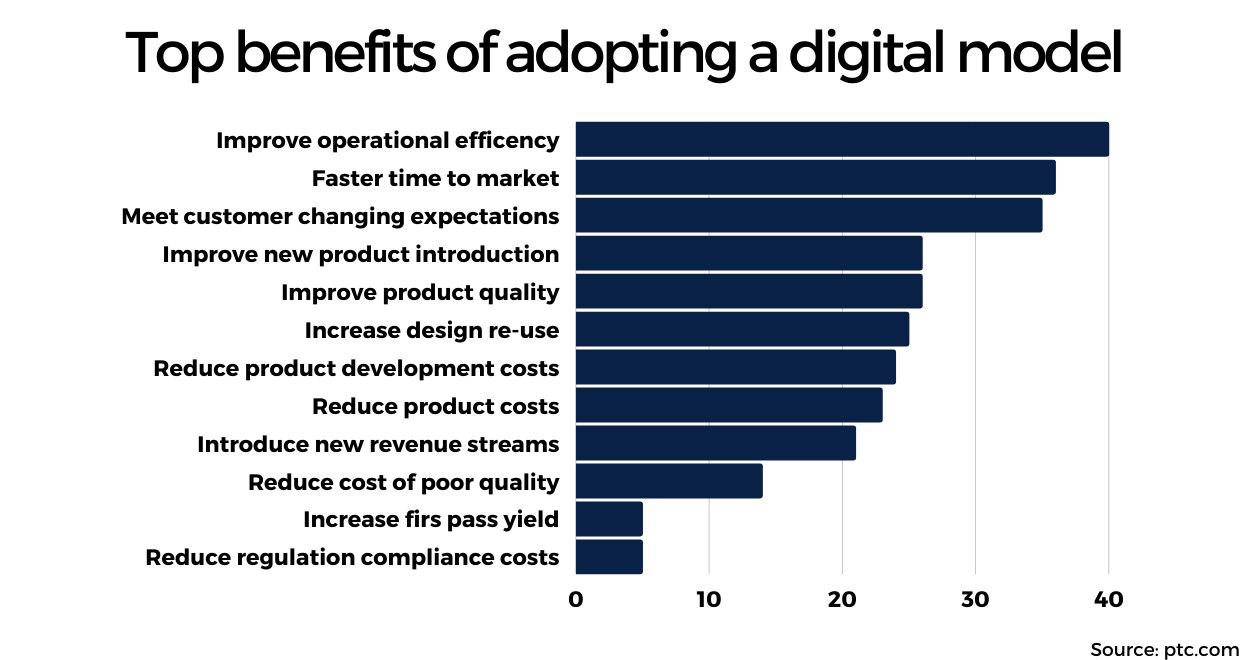Intro
The question of how to stay competitive and ensure the company’s growth has always been one of the critical challenges for businesses. To obtain new advantages, businesses always developed new strategies or modernized their operations. But one thing always remained the same: in order to be near the top of the wave, it is crucial to use your resources productively.
In almost any company, the time and efforts of the people are among the most valuable resources. But without digital management, these efforts are usually not used as effectively as possible. This progressively becomes a more prominent issue as the company continues to grow. This article will show why a Digital Transformation will instantly improve your business and how it will change it.
What is a Digital Transformation?
Despite a lot of attention in recent times, Digital Transformation often remains a magic word for many potential clients. It is even sometimes regarded as simply digitizing your business files into an electronic format. While this indeed is one of the necessary steps, Digital Transformation is a much broader set of changes.
At its core, Digital Transformation modifies how your company operates on most of the levels and ensures that every essential operation is either performed or supported by digital technology. At the same time, it also changes the company mindset. Digital Transformation requires companies to look at all processes from a new perspective.
Therefore, a proper Digital Transformation is also a very fundamental change. It starts the process of rethinking how the entire business operates. Often it replaces the old and sometimes very familiar practices with new digital approaches.
Yet despite how promising a Digital Transformation looks in and of itself, it is also important to state the desired goal(s) from the beginning. The way you perform it can differ depending on the purpose. You may either want to optimize your routine processes, improve the customer experience, or scale your business. While it is true that all of these goals can be achieved simultaneously through a digital transformation, it is crucial to know the exact effect you want to see when building the right system.
What Does a Digital Transformation Achieve?
As pointed out earlier, a Digital Transformation is not exactly a magical tool that will solve all your operational problems. However, other research done over the years highlights the effects. Companies and executives from various industries constantly report positive results after its implementation.
According to MIT, firms that have already been digitally mature for some time are 26% more profitable than their non-digitally-mature counterparts. They also report a 12% higher market valuation and generate 9% more revenue from physical assets.

PTC conducted another relevant survey among 128 executives. In particular, it perfectly indicated the three most cited benefits of a Digital Transformation. The most frequently occurring one is improved operational efficiency, with 40% of all executives pointing to it. Another 36% pointed out the faster time their product reaches the market. 35% of executives stated they better keep up with changes in customer expectations.
Operational Efficiency
This is exactly what the key effects of a digital transformation are. First of all, the processes that slow the business down are likely either manual, unconnected, or semi-automated. And this can be a big problem even if you don’t have a million-dollar revenue. Suppose you want to scale up your business, for example, open a new branch in another city. In this case, coordinating the data from several locations will likely become one of your most inconvenient problems.
And then imagine if you need to perform the digital transformation of your company. Yet, it already has several activity centers. How much effort and resources will it additionally cost you to transform all your operations in all locations? If you start scaling a business that is not yet digital-friendly, the old procedures will become only more established there.
This is why a digital transformation is sensible if you are in a smaller company with prospects to scale up shortly. It will probably be better for you to start your transformation right away before everything gets too big. Or at least it will be beneficial to lay down a foundation on which it can be more easily started. Taking steps to adopt digital operations in the future can essentially save most of the costs required to do it later.
The main goal here is to remember that a digital transformation is good at removing bottlenecks. Manual data entry, enormous reporting paperwork are among the most popular issues it successfully aims to resolve. As a result, a digital transformation makes your company faster.
Improved Customer Satisfaction
One of the most significant points executives like to make is that Digital Transformation makes your company more agile. One of the direct results of this is you get to know your customers better. According to a review by Adobe, digital-first companies are much better at customer experience. As a result, they are 64% more likely to overperform their business goals. There are two simple reasons for this
First, due to faster services, customers need to wait for your decisions less. It is one of the most emphasized benefits of a Digital Transformation. This is also true not only for the product release but also for all processes in the company.
The second one is that with a digital transformation, companies make use of their data. In recent years, data has become one of the most valuable assets for any business. Without digital operations, companies are not able to collect any significant amounts of data. Therefore, they entirely miss out on any possible conclusions that the data can deliver to them.
As a result, they are not aware of who their customers are. Data can show you not only that but how customers behave and what they prefer. Using it, you can decide on possible improvements to satisfy their needs.
Many executives cite that they experience rapid shifts in customer demand because of digital operations. Companies that do not have such awareness can change their plans only gradually. And even if they can predict future needs, these predictions will not be any closer to reality. Predictions based on large amounts of collected data will reflect your customers a lot more closely.
Is Everyone Doing a Digital Transformation?
It is not even a trend; it is a competitive necessity right now. Let the numbers speak for themselves. A Tech Pro Research survey, conducted as early as 2018, already indicated that 70 percent of responders either had a digital transformation strategy or were developing one. For 53 percent of them, transformation budgets increased in the previous year.
It is also worth noting that non-IT departments initiated a digital transformation in their company for half of the responders. A Digital Transformation eliminates many resource-consuming business steps. At some point in a business expansion, it becomes distinctly visible.
Also, companies get only more invested in the process as the advantages of it start to become apparent. According to the most recent 2021 survey done by NewVantage Partners among the different companies, 99% (yes, 99 percent) of firms invest in various data-related initiatives.
Moreover, according to PwC, only 9% of the companies decided to cut their spending on Digital Transformation during the COVID-19 crisis. And this is even though as many as 52% of them are cutting their investments. One of the main reasons for this is the significant growth the entire field experienced in 2020. This growth led Digital Transformation to become even more important for many companies in the new reality.
Conclusions
Digital Transformation offers many new benefits for businesses. It strengthens the operations, increasing their speed and allowing companies to scale up better. As a result, this leads to a much more superior customer experience compared to non-digitized companies.
The development of a Digital Transformation has only picked up speed recently. Right now, the vast majority of companies are making investments in the data-driven field. And after the current COVID-19 situation, the importance of being data-aware is hard to underestimate. You certainly can’t avoid Digital Transformation.





